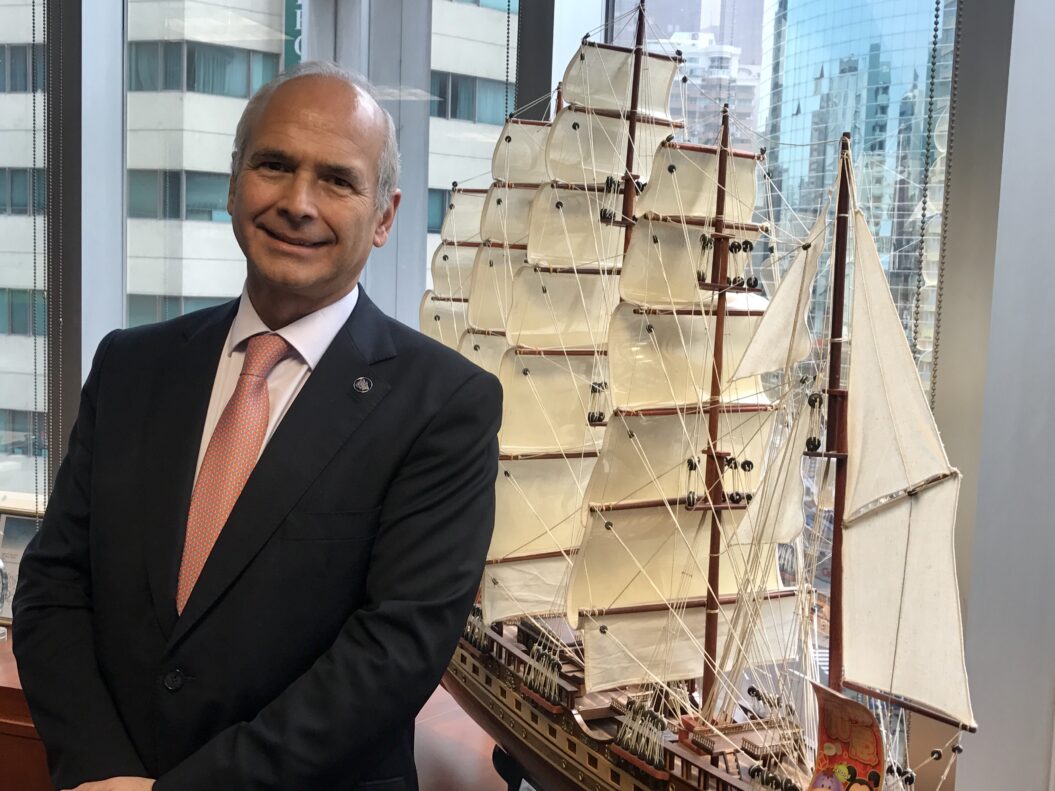Portuguese people who stand out abroad are helping to find out where business opportunities are and what kind of companies and activities the country can attract. An initiative that brings together Negócios and the Portuguese Diaspora Council.
1- What led you to leave Portugal?
Well, I moved to a different country because the company where I was working was bought, and, when I left that company, the alternatives I had in Portugal were not as attractive as this one that, in the meantime, emerged: being the CEO of Banco Nacional Ultramarino in Macau, an entity with 122 years of history, belonging to the Caixa Geral de Depósitos Group and also one of the banks issuing the local currency – the famous pataca. I agreed to come to Macau after considering the situation well with my wife, who also accompanied me on this adventure, about six years ago, and where she has a prominent role as the Director of the Macau delegation of Fundação Oriente/Casa Garden.
2- What advantages or disadvantages does being Portuguese bring you?
There is a great advantage to being Portuguese, which is the language, as there are still many things that work and are necessarily translated into Portuguese. The legal framework is based on Portuguese law and one of the official languages is Portuguese. There is also an important community, with at least 3000 Portuguese living here, which makes us feel more “at home”, despite the distance. On the other hand, there are many traditions in Macau that help us to settle down and feel closer to Portugal.
3- What obstacles did you have to overcome and how did you do it?
I suppose the most important thing was the distance. We are 12,000 kilometers from home and, of course, we miss our family and friends. But it also has the advantage of arriving in a different country with different ways of doing business and different ways of socializing, which forces us to leave our comfort zone and learn: different cultures and people. We have to invest time in how to deal with a new reality and we can take great advantage of this fact, as we can use past experiences by learning from new people and, of course, using what is good in both systems and cultures in the future. It’s fantastic at the age of 65 to be able to have this experience that makes us rejuvenate.
4- What do you admire most about the country where you are?
There are many things! Firstly, punctuality. Everyone has enormous respect for everyone else. Everyone arrives at meetings or events 5 or 10 minutes early. Being late does not exist in the dictionary. Time is never wasted waiting for others. Secondly, the city of Macau is completely safe. We live in a region where you can leave things anywhere and they will appear. It’s amazing how safe the place we live is. The city is multicultural and foreigners are very welcome. I also admire the pragmatism in the way of doing things and the ability to execute. We see new things happening at great speed. From the moment you think about something to the moment it is put into practice, it doesn’t take much time. And that is extremely motivating!
5- What do you most admire about the company or organization where you work?
BNU has a very strong brand. We have been here for 122 years, and the population sees us as a responsible, close and safe bank, which supports the economy, supporting private clients and companies in their projects. We work in close collaboration with local and central authorities, with the aim of diversifying the economy and ensuring its future growth, for the benefit of the population. The strength of the brand is incredible, an achievement achieved over the years with the support of different stakeholders: employees, customers, shareholders, authorities and suppliers. Something surprising is also that we are still one of the two banks issuing banknotes in circulation in Macau. We are very proud of this fact due to the trust that local and central governments have in BNU, the CGD group and the Portuguese State. Personally, I am very proud to sign the notes that we all use every day in Macau!
6- What recommendations would you give to Portugal and its entrepreneurs and managers?
To Portugal, if I may, I recommend the reduction of bureaucracy and the simplification of laws and regulations, which delay the investments so necessary for job creation and economic growth, which allows the country to compete with the best. It is also important to speed up the functioning of justice, which will also help us improve the country’s image among our compatriots and third parties. For companies, I suggested that everyone use and abuse punctuality. There is much less stress because time management allows for better planning and management of daily tasks. In Portugal, we have a unique quality which is the ability to improvise and “get away with it”. However, we abuse this capacity due to a lack of planning and organization, which is reflected in our ability to execute.
I would also tell companies in Portugal that they should look at Macau not as a small territory measuring 30 square kilometers, but rather see Macau as a gateway to the great bay. This is a project designed by the Chinese central government, which includes nine neighbouring cities, Hong Kong and Macau, a region of around 50,000 square kilometers, which represents around half of Portugal’s area, and where there are 80 million inhabitants, with a GDP of USD 1.5 trillion. In this “point of China” we have eight times the population of Portugal and eight times its GDP, a region that is growing rapidly, where companies can potentially do business if they invest in opening offices in Macau. Portuguese, English, Cantonese and Mandarin are spoken here, and there are Portuguese banks to support these companies and, from here, look at the Chinese mainland as a strong opportunity, but starting a pilot business here in the Greater Bay Area.
7- In which sectors of the country where you live could Portuguese companies find customers?
Despite the crisis in different parts of the world, including China, we still maintain one of the highest economic growth rates in the world – around 5%. There is a middle class with high purchasing power. There are many products that can be sold to local consumers who appreciate quality. I believe that Portuguese companies that are used to competing in other international markets can also sell their products here. The island of Hengqin, with three times the area of Macau and which is co-managed by the authorities of the province of Guangdong where we meet, with the authorities of Macau, in a logic of economic diversification, can be a gateway for Portuguese companies accustomed to competing on the international market in the cork, wine, olive oil, coffee, moulds, pharmaceutical, environment and IT sectors..
8- In which sectors in Portugal could companies from the country where you live want to invest?
There is already an accumulated stock of investment by Chinese companies in Portugal of almost 4 billion euros, in sectors as diverse as energy, banking, insurance, health, construction, public works, environment and wine production. Portugal is a gateway for Chinese companies to do business in Europe and also in Africa, via Portuguese-speaking countries and even in South America. I suppose that in the automotive sector and in the port sector (associated with Chinese investment in the “Faixa and Route”) there are still good opportunities for Chinese companies to consider investing. Portuguese companies are an excellent vehicle for the internationalization of Chinese companies in Europe and Africa, as I mentioned previously.
9- What is the competitive advantage of the country you live in that could be replicated in Portugal?
A competitive advantage that I observe here is the speed of entry to the market: between idea generation, execution and launch of the product or service on the market. There is a very strong ability to execute and the Portuguese also do this when they are motivated and well directed to do so. When we look at what is happening in Luxembourg, which has one of the highest GDP per capita in the world and where its population is made up of 15% Portuguese, we see that we are also capable. With good planning, organization, control mechanisms and adequate governance, we can aspire to perform like the best, also given our innate capacity for improvisation, which, as I said a moment ago, we should not use excessively… We should reduce bureaucracy and implement things that we all know should and can be done in Portugal to improve our competitiveness and have a more vibrant economy, so that our children and grandchildren can find jobs that allow them to realize their dreams, living with dignity and without need to emigrate.
10- Are you thinking of returning to Portugal? Why?
Of course I will go back to Portugal! I really like being in Macau, where I feel at home and where I was very well received. But I love my country. I think Portugal is one of the best places in the world to live. I visited many countries for work, and, in the end, I have no doubts about the fact that Portugal is one of the best places to live. Many foreigners have already discovered this. There are many things in our country that, taken together, are unparalleled. Multiculturalism, friendliness, safety, cost of living, food, climate, quality of infrastructure and healthcare system are factors that lead people to choose Portugal as a destination of choice. I will definitely return to my country too!
Read the original article here.







